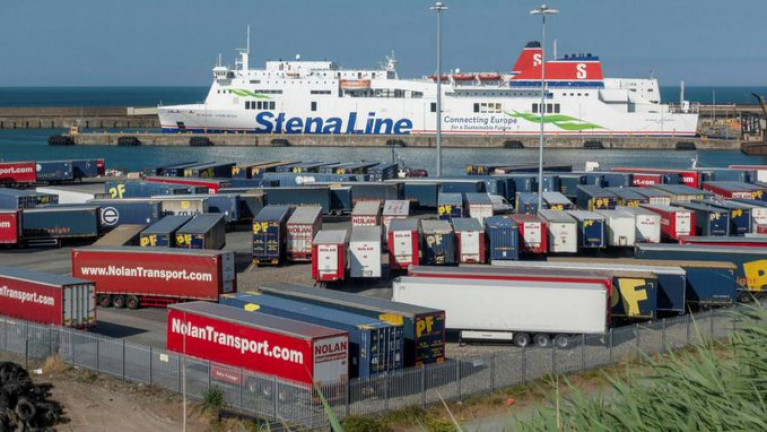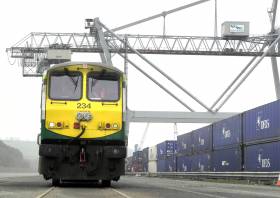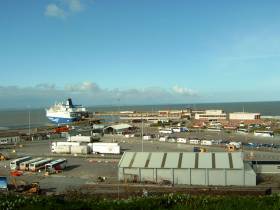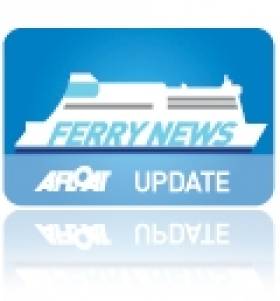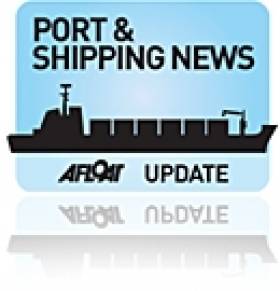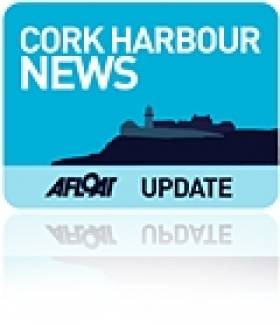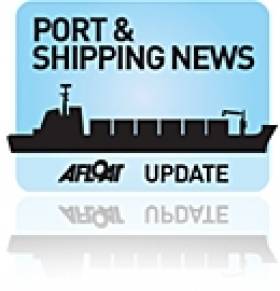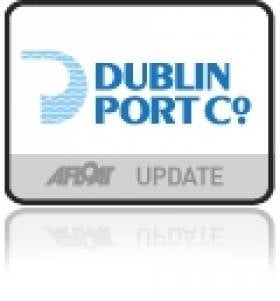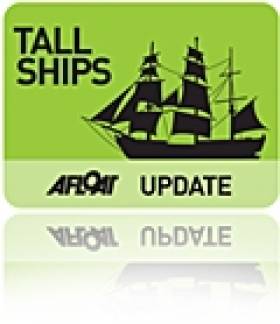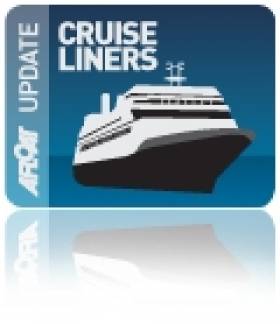Displaying items by tag: Irish Rail
Irish Rail (Iarnród Eireann) has announced the purchase of an 18-acre site in Rosslare Europort to support the future growth of the (ferry)harbour which has seen a significant increase in traffic and new routes.
The company also revealed that it has awarded the contract for a new fully-digital Port Terminal Management System.
The developments are part of the overall Rosslare Europort Masterplan designed to enhance port operations and customer experience.
Agreement has been reached to secure a strategic 18 acres of land on an adjacent site that is zoned for commercial use, beside the proposed new port freight entrance.
The site will have direct connection to both the port and the new port access road being constructed by Transport Infrastructure Ireland and Wexford County Council.
Wexford People has more on the development.
Also this week Irish Rail was awarded €2.5 million from EU funding into projects to improve transport links including by road with the port.
Port of Waterford Rail-Freight Contract Ceases
#Ports&Shipping - Port Waterford has confirmed that the contract held by DFDS with Irish Rail to operate a freight train between Belview Port and Ballina, Co Mayo ceases tomorrow (today, 29 May).
As RTE News reports, the Port of Waterford Chief Executive Frank Ronan said they were sorry to see the end of the service.
"It was a nice addition to our portfolio and it was great to be able to provide a port service to stakeholders in the northwest region.
"As the volumes involved were relatively small and likely to be replaced, we do not expect that our throughput of containers will be negatively impacted.
"However, it is a shame to see something that can take trucks off the road and reduce carbon emissions ceasing rather than growing and prospering.
For more on the storey click here.
Irish Rail Operated Rosslare Europort to Grow?
#Rosslare2040 - Rail operated Rosslare Europort has featured prominently in the their response to the Governments ‘National Planning Framework’ consultation.
According to MultiModal, the National Planning Framework is the plan that sets out what the transport needs for the country will be in 2040.
A desire to deepen the port to accommodate modern larger high-capacity vessels and develop the port into a multimodal facility which would include the construction of a rail-freight interface is expressed.
Currently the port mostly handles RoRo freight. The port is the second largest seaport in Ireland for unitised road freight and is crucial for the economy and employment in the regional hinterland and for the national economy. The response states the need to improve connectivity to the Port, noting that this direct link to mainland Europe will be more vital post Brexit.
Rosslare Europort has road connections to Dublin, Waterford, Cork and Limerick and intermodal rail freight would benefit from links to Dublin and the West via Waterford.
Irish Rail intermodal trains will be increased in length by around a third shortly following completion of trails to operate longer trains. Presently regular intermodal train operate between Dublin Port, Ballina and Waterford Port.
#Rail&Sail – Irish Rail have amendment the Rosslare Europort-Dublin railway service so to provide 'greater connectivity' for ferry passengers, albeit the new schedule was only introduced for this year of The Gathering, writes Jehan Ashmore.
The National Transport Authority approved the amended rail timetable which started this month and remains valid until 2 September.
The changes are to improve certain connection times between ferries arriving in the Wexford port and passengers making onward rail journeys to the capital and beyond.
Special Gathering travel tickets have been introduced by Irish Rail and Bus Éireann to give ticket holders unlimited travel across both companies' extensive networks for either three days or seven days.
Below are the changes made to the Rosslare Europort-Dublin (Connolly Station) service schedule.
- The 17:55 Rosslare Europort to Connolly will be deferred until 19:15 Monday to Saturday.
- The 17:36 Connolly to Wexford service will depart at usual time but there will be an extended journey time between Enniscorthy and Wexford with an arrival time of 20:25 into Wexford Monday to Friday.
- On Sundays the 17.40 Rosslare Europort to Connolly will be deferred to 19:00.
Rosslare Europort is unique in that the harbour is operated by the state owned transport company and from where three ferry operators run routes to Wales and France, including the seasonal-only Roscoff route which resumed recently.
#SeaRailFreight- A new container rail-freight service between Waterford Port and Ballina began operating this week, to link in with DFDS Logistics sailing schedules to and from Europe.
The container trains are running to a twice weekly service in each direction linking the Belview Port terminal downriver of Waterford City and the northern Co. Mayo town.
According to Irish Rail (Iarnród Éireann), the new service will benefit customers in the west and north-west of Ireland in particular, providing them with a cost effective alternative when compared with a road based shipping. Coupled with this, the customer also reduces their carbon footprint.
The trains are scheduled to meet DFDS lo-lo vessels sailing from Belview Port to Rotterdam, which allows for onward delivery into Europe. Customers can now load in the west of Ireland on Tuesday morning and deliver in The Netherlands on Thursday pm/Friday am.
Rotterdam also provides access to DFDS sailings to Norway, and rail connections to Italy, allowing for a rail-sea-rail connection from Ballina to Milan.
DFDS will utilise a significant amount of available rail-wagons, but have left scope to develop the service further by introducing new customers, both internal Irish traffic and import / export traffic.
This is an important addition to the DFDS services in Ireland, and as a customer for Irish Rail's freight division. The new service is covering a longer distance, guaranteed volumes and direct port access.
The introduction of the service will see freight volumes increase from 91m tonne kilometres in 2012 to 105 m tonne kilometres approximately in 2013.
Road, Rail or ‘Sail’ to Cobh
There's also the option of departing Cork-city centre to Cobh by taking an excursion on the River Lee on the passenger-tender Spirit of the Isles. Sailings depart the city's Penrose Quay, which is on the same side to the railway (Kent) station.
Sailings will operate this Saturday and Sunday and for the remaining weekends throughout September. The boat's Saturday schedule departs the city at 11am and arrives at Cobh's Kennedy Quay at 12.15pm.
In addition there is a Lower harbour tour off Cobh on Saturdays and Sundays, departing Kennedy Pier, Cobh - 12.30pm and returning to Kennedy Pier at 1.45pm. The boat then departs Cobh at 2pm to return to Cork with an arrival time of 3.15pm. For both this Saturday and Sunday sailing schedules, fares and further information go to www.corkharbourcruises.com
In the late 1980's the Spirit of the Isles then named Ingot operated excursions for several seasons from Dun Laoghaire's East Pier to Dalkey Sound and Killiney Bay.
Returning to the third annual Cork Harbour Open Day there will also be a free shuttle-service running in the lower harbour calling at Ringaskiddy, Monkstown, Cobh, Aghada and Crosshaven. The fast-ferry RIB operator 'Whale of a Time' is providing the free service which is sponsored by the Port of Cork Company and National Maritime College of Ireland (NMCI). For further information visit http://www.whaleofatime.net/Home.html
- Dun Laoghaire
- Cork Harbour
- port of Cork
- Cruise Liners
- River Lee
- Cork Harbour Open Day
- NMCI
- Cobh Cruise Terminal
- National Maritime College of Ireland (NMCI)
- Ports and Shipping News
- Cork Harbour News
- Irish Rail
- Port of Cork Company
- Cunard Line
- Queen Elizabeth
- Whale of a Time
- Cruise Liner news
- Dalkey Sound
- Cruise ship news
- Midelton Food & Drink Festival
- Ingot
- Killiney Bay
- Irish passenger excursion vessels
- Cork Harbour Cruises
- CorkCobh
- Cork (Kent) station
- Spirit of the Isles
Big Plans for Rosslare Europort
Ambitious plans to introduce load-on load-off (Lo-Lo) facilities at Rosslare Europort have been announced, according to a report in yesterday's Wexford People.
However, to facilitate all these developments, Mr Lynch said they will need the reclamation of up to 20 hectares of additional land and the deepening of part, or all, of the port from the current 7.2m to 9m and perhaps, eventually, 11m.
Mr Lynch said these developments would be facilitated, and accelerated, by of a port centric logistics zone (a grouping of activities dealing with freight transportation) on lands beside the south-eastern port.
Mr Breen said he recognises the 'fundamental and strategic importance of Rosslare Europort to the economic development of the county'.
The county manager said he will recommend that 'appropriate policies, objectives and development management standards are included in the draft plan to facilitate the development of the port', subject to the appropriate technical and environmental assessments.
As part of his submission, Mr Lynch also requested that the '1902 Lighthouse' at the port, which is recognised on the National Inventory of Architectural Services, not be included on the Record of Protected Structures.
Mr Breen said he would give further consideration as to whether it would be appropriate to de-list the lighthouse in advance of the draft plan.
Next month the port will host the annual Irish Ports Conference in the Ferrycarrig Hotel, Wexford on Friday 30 September.
- Rosslare Europort
- Ports and Shipping News
- Irish Rail
- Iarnrod Eireann
- Ferry news
- Rosslare Harbour
- Irish Ports Conference
- Irish Ports Association
- Ferrycarrig Hotel
- Railfreight
- Port Development
- National Inventory of Architectural Services
- Record of Protected Structures
- Irish Lighthouses
- Lighthouses of Ireland news
New €1.5m Rail-Spur for Dublin Port
The minister welcomed "the important investment by Dublin Port Company in its rail network. It will further enhance the attractiveness of the port as a destination for rail-based freight. The project represents a commitment on the part of Dublin Port Company and Iarnród Éireann to customers who want to move goods by rail".
The project took six months to complete and the public private partnership involved Dublin Port Company, Iarnród Éireann and the first customer of the new facility, International Warehousing and Transport (IWT).
IWT is a privately owned Irish logistics company, which already operates freight-trains to Ballina that are expected to increase from 4 to 5 trains per week in each direction as a result of this investment. The rail-operator believes that the service will save up to 5.5million road kilometres annually and reduce CO2 emissions by up to 2,750 tonnes.
The Irish Exporters Association also welcomed the development of the IWT freight operation at the new facility, where increased frequency in services will enhance Ireland's contribution to the European Union's modal shift aspirations from road to rail.
The Common User Terminal is also open to other shipping companies. Existing clients using the lo-lo container terminal operated by Burke Shipping Group through its subsidiary Portroe Stevedores are C2C Lines, APL, Coastal Containers, Evergreen, Gracechurch and OOCL . The terminal also has a ro-ro berth facility where CLdN /Cobelfret operate from on routes to Belgium and The Netherlands.
In addition to the Dublin-Ballina service the port exports 400,000 tonnes of lead and zinc concentrate from the freight customers Boliden/Tara Mines with 15 trains per week. The facility at Alexandra Basin Jetty is regularly served by vessels from Arklow Shipping Ltd, where the 2011 newbuild Arklow Field (2,998 tonnes) is currently berthed.
- Dublin Port
- Dublin Port Company
- Arklow Shipping Ltd
- Irish Exporters Association
- Port of Dublin
- Ports and Shipping News
- IEA
- Minister for Transport
- Ocean Pier
- Irish Rail
- Iarnrod Eireann
- Portroe Stevedores
- Dublin Port news
- IWT
- ASL
- Leo Varadkar T.D.
- Port of Dublin news
- Railfreight
- International Warehousing and Transport
- Alexandra Basin East
- Common User Terminal
- Burke Shipping Group
- Clnd Cobelfret
- Boliden
- Tara Mines
- Arklow Field
- Dublin Shipping
- Lead mines
- Zinc mines
- Irish Railways
- Dublin Port railhead
Reviving the Age of Steam for Waterford's Tall Ships
In The Irish Times on Thursday, Tim Sweetman from Islandbridge writes that steam trains could add a touch of old-fashioned glamour to the Tall Ships Races in Waterford this summer.
"Perhaps Irish Rail and the Railway Preservation Society might come together to provide more atmosphere," he suggests. "There's a perfectly good line available from Waterford to Rosslare that is looking for some business."
What else could be done to make the most of the Tall Ships visit? Make your own suggestions in the comments below!
A First for Cobh as Two Cruise Giants Come and Go
In an unprecedented scheduling of cruiseships to the Port of Cork (Cobh), the inbound Independence of the Seas (154,407 tonnes) the largest cruiseship to call to any Irish port, passed the 122,000 tonnes Celebrity Eclipse which was preparing to depart from the town's cruise terminal.
Some 15 minutes later Celebrity Eclipse pulled away from the berth. During that timeframe the Independence of the Seas had completely turned around in the opposite direction to face Cobh after maneuvering in the swinging basin between Cobh and the Naval Base on Haulbowline Island.
The 4,175-passenger Independence of the Seas is the third of the 'Freedom' class vessels. She has a length of 339m and is a mere 11m shorter in distance to that of the 350m berth at Cobh. The 38m wide cruiseship has a draft of 8.7m and the depth of water at the town's quayside is 9.1m.
The 15-deck vessel was built by Aker Finnyards in Turku, Finland in 2008 for Royal Caribbean International (RCI). Amenities on the Freedom class consist of the an innovative surf park, canitilevered whirlpools, ice-skating rink, full-size boxing ring and a H2O Zone waterpark.
As for the 3,179-passenger Celebrity Eclipse, she is the second of five 'Solstice' class sisters and measures 317m (length) 48m (beam) and draws 8.6m. On the top deck there is the fresh green grass located at Lawn Club. She was built by the Meyer Werft shipyard in Papenburg, Germany and entered service last year for her owners Celebrity Cruises.
Independence of the Seas departed yesterday afternoon on an overnight passage from Southampton where the vessel is based in the summer and for the winter she is based out of Florida. The Celebrity Eclipse departed the UK south coast port from Cobh where the larger cruiseship is also to make overnight port of call.
In total 10,000 passengers and crew will of visited the Cork Harbour region alone over the May Bank holiday. To meet the surge in demand for the shore-based excusions a fleet of buses awaited and additional trains were also laid-on by Irish Rail. The railway station is located next-door to the Cobh Heritage Centre which retraces the town's strong trans-Atlantic liner era.
- Cobh
- Cork Harbour
- port of Cork
- Independence of the Seas
- Ports and Shipping
- Cobh Cruise Terminal
- Ports and Shipping News
- Cork Harbour News
- Irish Rail
- Celebrity Eclipse
- Port of Cork News
- Aker Finnyards
- Celebrity Cruises
- Royal Caribbean International
- Freedomclass
- Solsticeclass
- MeyerWerft
- Cobh Heritage Centre




























